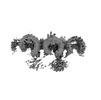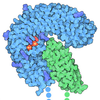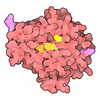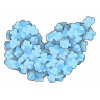+ Open data
Open data
- Basic information
Basic information
| Entry |  | |||||||||
|---|---|---|---|---|---|---|---|---|---|---|
| Title | ectoTLR3-mAb12-poly(I:C) complex | |||||||||
 Map data Map data | ||||||||||
 Sample Sample |
| |||||||||
| Function / homology |  Function and homology information Function and homology informationTLR3 deficiency - HSE / UNC93B1 deficiency - HSE / TICAM1 deficiency - HSE / type III interferon production / positive regulation of type III interferon production / response to dsRNA / TRAF3 deficiency - HSE / regulation of dendritic cell cytokine production / Toll Like Receptor 3 (TLR3) Cascade / I-kappaB phosphorylation ...TLR3 deficiency - HSE / UNC93B1 deficiency - HSE / TICAM1 deficiency - HSE / type III interferon production / positive regulation of type III interferon production / response to dsRNA / TRAF3 deficiency - HSE / regulation of dendritic cell cytokine production / Toll Like Receptor 3 (TLR3) Cascade / I-kappaB phosphorylation / TLR3-mediated TICAM1-dependent programmed cell death / inflammatory response to wounding / toll-like receptor 3 signaling pathway / necroptotic signaling pathway / detection of virus / activation of NF-kappaB-inducing kinase activity / RIP-mediated NFkB activation via ZBP1 / hyperosmotic response / endolysosome membrane / positive regulation of cytokine production involved in inflammatory response / Trafficking and processing of endosomal TLR / positive regulation of macrophage cytokine production / pattern recognition receptor activity / toll-like receptor signaling pathway / RSV-host interactions / cellular response to exogenous dsRNA / response to exogenous dsRNA / negative regulation of osteoclast differentiation / cellular response to interferon-beta / positive regulation of interferon-alpha production / extrinsic apoptotic signaling pathway / positive regulation of chemokine production / JNK cascade / TICAM1,TRAF6-dependent induction of TAK1 complex / TICAM1-dependent activation of IRF3/IRF7 / positive regulation of interleukin-12 production / positive regulation of interferon-beta production / TICAM1, RIP1-mediated IKK complex recruitment / extracellular matrix / positive regulation of interleukin-8 production / positive regulation of JNK cascade / microglial cell activation / cellular response to virus / cellular response to type II interferon / positive regulation of inflammatory response / positive regulation of non-canonical NF-kappaB signal transduction / cellular response to mechanical stimulus / transmembrane signaling receptor activity / positive regulation of angiogenesis / male gonad development / positive regulation of interleukin-6 production / positive regulation of tumor necrosis factor production / double-stranded RNA binding / positive regulation of type II interferon production / cellular response to xenobiotic stimulus / signaling receptor activity / positive regulation of canonical NF-kappaB signal transduction / defense response to virus / early endosome / endosome membrane / defense response to bacterium / positive regulation of apoptotic process / Golgi membrane / lysosomal membrane / innate immune response / positive regulation of gene expression / endoplasmic reticulum membrane / signal transduction / positive regulation of transcription by RNA polymerase II / extracellular space / identical protein binding / membrane / plasma membrane / cytoplasm Similarity search - Function | |||||||||
| Biological species |  Homo sapiens (human) / synthetic construct (others) Homo sapiens (human) / synthetic construct (others) | |||||||||
| Method | single particle reconstruction / cryo EM / Resolution: 3.91 Å | |||||||||
 Authors Authors | Lim CS / Jang YH / Lee GY / Han GM / Lee JO | |||||||||
| Funding support |  Korea, Republic Of, 2 items Korea, Republic Of, 2 items
| |||||||||
 Citation Citation |  Journal: Nat Commun / Year: 2022 Journal: Nat Commun / Year: 2022Title: TLR3 forms a highly organized cluster when bound to a poly(I:C) RNA ligand. Authors: Chan Seok Lim / Yoon Ha Jang / Ga Young Lee / Gu Min Han / Hye Jin Jeong / Ji Won Kim / Jie-Oh Lee /  Abstract: Toll-like Receptor 3 (TLR3) initiates a potent anti-viral immune response by binding to double-stranded RNA ligands. Previous crystallographic studies showed that TLR3 forms a homodimer when bound to ...Toll-like Receptor 3 (TLR3) initiates a potent anti-viral immune response by binding to double-stranded RNA ligands. Previous crystallographic studies showed that TLR3 forms a homodimer when bound to a 46-base pair RNA ligand. However, this short RNA fails to initiate a robust immune response. To obtain structural insights into the length dependency of TLR3 ligands, we determine the cryo-electron microscopy structure of full-length TLR3 in a complex with a synthetic RNA ligand with an average length of ~400 base pairs. In the structure, the dimeric TLR3 units are clustered along the double-stranded RNA helix in a highly organized and cooperative fashion with a uniform inter-dimer spacing of 103 angstroms. The intracellular and transmembrane domains are dispensable for the clustering because their deletion does not interfere with the cluster formation. Our structural observation suggests that ligand-induced clustering of TLR3 dimers triggers the ordered assembly of intracellular signaling adaptors and initiates a robust innate immune response. | |||||||||
| History |
|
- Structure visualization
Structure visualization
| Supplemental images |
|---|
- Downloads & links
Downloads & links
-EMDB archive
| Map data |  emd_32852.map.gz emd_32852.map.gz | 168.2 MB |  EMDB map data format EMDB map data format | |
|---|---|---|---|---|
| Header (meta data) |  emd-32852-v30.xml emd-32852-v30.xml emd-32852.xml emd-32852.xml | 15 KB 15 KB | Display Display |  EMDB header EMDB header |
| Images |  emd_32852.png emd_32852.png | 52.8 KB | ||
| Archive directory |  http://ftp.pdbj.org/pub/emdb/structures/EMD-32852 http://ftp.pdbj.org/pub/emdb/structures/EMD-32852 ftp://ftp.pdbj.org/pub/emdb/structures/EMD-32852 ftp://ftp.pdbj.org/pub/emdb/structures/EMD-32852 | HTTPS FTP |
-Validation report
| Summary document |  emd_32852_validation.pdf.gz emd_32852_validation.pdf.gz | 424 KB | Display |  EMDB validaton report EMDB validaton report |
|---|---|---|---|---|
| Full document |  emd_32852_full_validation.pdf.gz emd_32852_full_validation.pdf.gz | 423.6 KB | Display | |
| Data in XML |  emd_32852_validation.xml.gz emd_32852_validation.xml.gz | 6.9 KB | Display | |
| Data in CIF |  emd_32852_validation.cif.gz emd_32852_validation.cif.gz | 7.9 KB | Display | |
| Arichive directory |  https://ftp.pdbj.org/pub/emdb/validation_reports/EMD-32852 https://ftp.pdbj.org/pub/emdb/validation_reports/EMD-32852 ftp://ftp.pdbj.org/pub/emdb/validation_reports/EMD-32852 ftp://ftp.pdbj.org/pub/emdb/validation_reports/EMD-32852 | HTTPS FTP |
-Related structure data
| Related structure data |  7wvfMC  7wv3C  7wv4C  7wv5C  7wveC  7wvjC M: atomic model generated by this map C: citing same article ( |
|---|---|
| Similar structure data | Similarity search - Function & homology  F&H Search F&H Search |
- Links
Links
| EMDB pages |  EMDB (EBI/PDBe) / EMDB (EBI/PDBe) /  EMDataResource EMDataResource |
|---|---|
| Related items in Molecule of the Month |
- Map
Map
| File |  Download / File: emd_32852.map.gz / Format: CCP4 / Size: 178 MB / Type: IMAGE STORED AS FLOATING POINT NUMBER (4 BYTES) Download / File: emd_32852.map.gz / Format: CCP4 / Size: 178 MB / Type: IMAGE STORED AS FLOATING POINT NUMBER (4 BYTES) | ||||||||||||||||||||
|---|---|---|---|---|---|---|---|---|---|---|---|---|---|---|---|---|---|---|---|---|---|
| Voxel size | X=Y=Z: 1.0865 Å | ||||||||||||||||||||
| Density |
| ||||||||||||||||||||
| Symmetry | Space group: 1 | ||||||||||||||||||||
| Details | EMDB XML:
|
-Supplemental data
- Sample components
Sample components
-Entire : ectoTLR3-mAb12-poly(I:C) complex
| Entire | Name: ectoTLR3-mAb12-poly(I:C) complex |
|---|---|
| Components |
|
-Supramolecule #1: ectoTLR3-mAb12-poly(I:C) complex
| Supramolecule | Name: ectoTLR3-mAb12-poly(I:C) complex / type: complex / Chimera: Yes / ID: 1 / Parent: 0 / Macromolecule list: #1-#4 |
|---|
-Supramolecule #2: ectoTLR3-mAb12
| Supramolecule | Name: ectoTLR3-mAb12 / type: complex / Chimera: Yes / ID: 2 / Parent: 1 / Macromolecule list: #1, #4 |
|---|---|
| Source (natural) | Organism:  Homo sapiens (human) Homo sapiens (human) |
-Supramolecule #3: poly(I:C)
| Supramolecule | Name: poly(I:C) / type: complex / Chimera: Yes / ID: 3 / Parent: 1 / Macromolecule list: #2-#3 |
|---|
-Macromolecule #1: Toll-like receptor 3
| Macromolecule | Name: Toll-like receptor 3 / type: protein_or_peptide / ID: 1 / Number of copies: 2 / Enantiomer: LEVO |
|---|---|
| Source (natural) | Organism:  Homo sapiens (human) Homo sapiens (human) |
| Molecular weight | Theoretical: 78.423375 KDa |
| Recombinant expression | Organism:  Trichoplusia ni (cabbage looper) Trichoplusia ni (cabbage looper) |
| Sequence | String: ADPKCTVSHE VADCSHLKLT QVPDDLPTNI TVLNLTHNQL RRLPAANFTR YSQLTSLDVG FNTISKLEPE LCQKLPMLKV LNLQHNELS QLSDKTFAFC TNLTELHLMS NSIQKIKNNP FVKQKNLITL DLSHNGLSST KLGTQVQLEN LQELLLSNNK I QALKSEEL ...String: ADPKCTVSHE VADCSHLKLT QVPDDLPTNI TVLNLTHNQL RRLPAANFTR YSQLTSLDVG FNTISKLEPE LCQKLPMLKV LNLQHNELS QLSDKTFAFC TNLTELHLMS NSIQKIKNNP FVKQKNLITL DLSHNGLSST KLGTQVQLEN LQELLLSNNK I QALKSEEL DIFANSSLKK LELSSNQIKE FSPGCFHAIG RLFGLFLNNV QLGPSLTEKL CLELANTSIR NLSLSNSQLS TT SNTTFLG LKWTNLTMLD LSYNNLNVVG NDSFAWLPQL EYFFLEYNNI QHLFSHSLHG LFNVRYLNLK RSFTKQSISL ASL PKIDDF SFQWLKCLEH LNMEDNDIPG IKSNMFTGLI NLKYLSLSNS FTSLRTLTNE TFVSLAHSPL HILNLTKNKI SKIE SDAFS WLGHLEVLDL GLNEIGQELT GQEWRGLENI FEIYLSYNKY LQLTRNSFAL VPSLQRLMLR RVALKNVDSS PSPFQ PLRN LTILDLSNNN IANINDDMLE GLEKLEILDL QHNNLARLWK HANPGGPIYF LKGLSHLHIL NLESNGFDEI PVEVFK DLF ELKIIDLGLN NLNTLPASVF NNQVSLKSLN LQKNLITSVE KKVFGPAFRN LTELDMRFNP FDCTCESIAW FVNWINE TH TNIPELSSHY LCNTPPHYHG FPVRLFDTSS CKSGRLVPRG SHHHHHH |
-Macromolecule #4: mAb12
| Macromolecule | Name: mAb12 / type: protein_or_peptide / ID: 4 / Number of copies: 1 / Enantiomer: LEVO |
|---|---|
| Source (natural) | Organism:  Homo sapiens (human) Homo sapiens (human) |
| Molecular weight | Theoretical: 27.712111 KDa |
| Recombinant expression | Organism:  Trichoplusia ni (cabbage looper) Trichoplusia ni (cabbage looper) |
| Sequence | String: ADPQVQLQQS GPGLVKPSQT LSLTCAISGD SVSSNSAAWG WIRQSPGRGL EWLGIIQKRS KWYNNYAVSV KSRITINPDT SKNQFSLQL NSVTPEDTAV YYCARYSYPF YSIDYWGQGT LVTVSSGGGG SGGGGSGGGG SGGGGSQSVL TQPPSVSVAP G QTARISCS ...String: ADPQVQLQQS GPGLVKPSQT LSLTCAISGD SVSSNSAAWG WIRQSPGRGL EWLGIIQKRS KWYNNYAVSV KSRITINPDT SKNQFSLQL NSVTPEDTAV YYCARYSYPF YSIDYWGQGT LVTVSSGGGG SGGGGSGGGG SGGGGSQSVL TQPPSVSVAP G QTARISCS GDNIGSYYVH WYQQKPGQAP VLVIYEDSER PSGIPERFSG SNSGNTATLT ISGTQAEDEA DYYCSSYDDP NF QVFGGGT KLTVLGHHHH HHHH |
-Macromolecule #2: RNA (46-MER)
| Macromolecule | Name: RNA (46-MER) / type: rna / ID: 2 / Number of copies: 1 |
|---|---|
| Source (natural) | Organism: synthetic construct (others) |
| Molecular weight | Theoretical: 13.993408 KDa |
| Sequence | String: CCCCCCCCCC CCCCCCCCCC CCCCCCCCCC CCCCCCCCCC CCCCCC |
-Macromolecule #3: RNA (46-MER)
| Macromolecule | Name: RNA (46-MER) / type: rna / ID: 3 / Number of copies: 1 |
|---|---|
| Source (natural) | Organism: synthetic construct (others) |
| Molecular weight | Theoretical: 15.143821 KDa |
| Sequence | String: IIIIIIIIII IIIIIIIIII IIIIIIIIII IIIIIIIIII IIIIII |
-Experimental details
-Structure determination
| Method | cryo EM |
|---|---|
 Processing Processing | single particle reconstruction |
| Aggregation state | particle |
- Sample preparation
Sample preparation
| Concentration | 1.0 mg/mL | |||||||||
|---|---|---|---|---|---|---|---|---|---|---|
| Buffer | pH: 5.5 Component:
| |||||||||
| Grid | Model: Quantifoil R1.2/1.3 / Material: COPPER / Mesh: 300 / Support film - Material: CARBON / Support film - topology: HOLEY / Pretreatment - Type: GLOW DISCHARGE / Pretreatment - Time: 60 sec. / Pretreatment - Atmosphere: AIR | |||||||||
| Vitrification | Cryogen name: ETHANE / Chamber humidity: 100 % / Chamber temperature: 277 K / Instrument: FEI VITROBOT MARK IV |
- Electron microscopy
Electron microscopy
| Microscope | TFS GLACIOS |
|---|---|
| Image recording | Film or detector model: FEI FALCON IV (4k x 4k) / Average electron dose: 40.0 e/Å2 |
| Electron beam | Acceleration voltage: 200 kV / Electron source:  FIELD EMISSION GUN FIELD EMISSION GUN |
| Electron optics | Illumination mode: FLOOD BEAM / Imaging mode: BRIGHT FIELD / Nominal defocus max: 2.5 µm / Nominal defocus min: 0.9 µm |
- Image processing
Image processing
| Final reconstruction | Applied symmetry - Point group: C1 (asymmetric) / Resolution.type: BY AUTHOR / Resolution: 3.91 Å / Resolution method: FSC 0.143 CUT-OFF / Number images used: 136835 |
|---|---|
| Initial angle assignment | Type: OTHER |
| Final angle assignment | Type: OTHER |
 Movie
Movie Controller
Controller




















